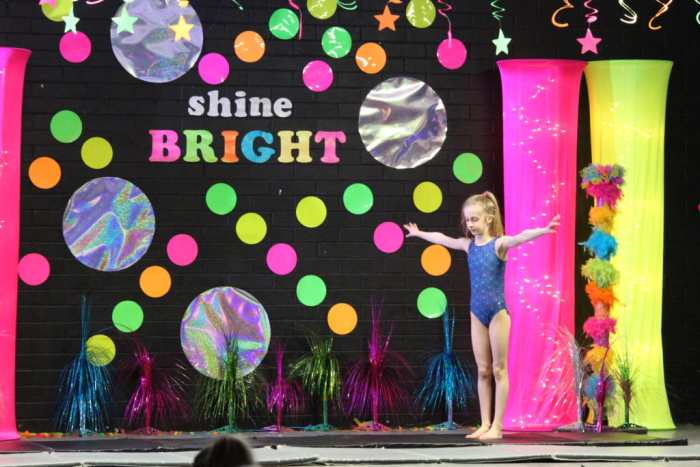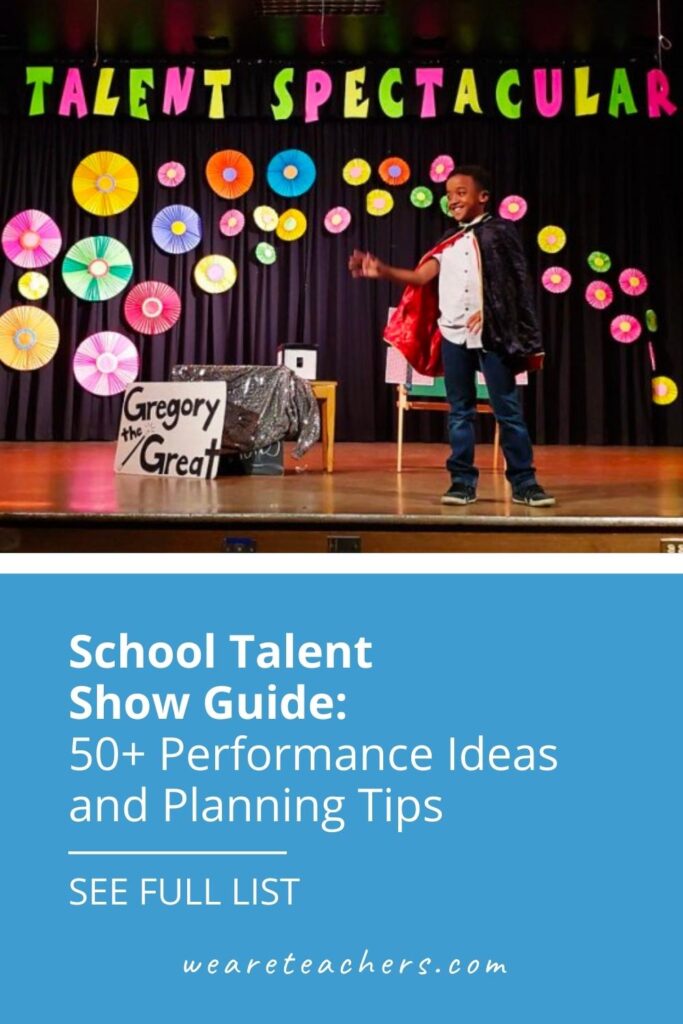Talent shows have a long history, and they’ve become more popular than ever with the advent of shows like America’s Got Talent. Hosting a school talent show can be a terrific fundraiser or just a fantastic way to let your students (and teachers!) show off their amazing skills. Here’s what you need to know to plan a good event, plus lots of incredible talent show ideas for kids and adults.
How To Plan a School Talent Show

Source: De Su Mama
It takes some work to put together a quality talent show, but seeing kids bask in the cheers of their fellow students makes it all worth the effort. Here are some of the things you’ll want to think about as you prepare for your show.
Show or Contest?
First up, decide whether you want your show to just be a display of incredible talent, or if you’d like it to be a judged contest. There are benefits to both, of course, so it simply comes down to whether you want to add another layer of complexity into your planning. If it’s a contest, you’ll need judges and prizes, and you may want to break the acts into different categories. Take some time to consider which is right for your school.
Audience
Will you be putting on a show for parents, family, and friends, or just for students? This factor will have an impact on a lot of your other details, so figure this out up front. You may need to consider how much room you have, as well as if you’re planning to charge for tickets.
Date and Time
If possible, consider holding your show during the school day. This way, all kids have the chance to participate. After-school events depend on parents’ ability and willingness to participate, and this will always leave some kids out. Remember, you can always livestream the show, or record it and make the video available for parents and friends to watch later.
Also consider how long you want your show to be, since that will determine how many acts you can have. If it’s during the school day, you’ll likely have to fit into a very specific time frame. An after-school or evening event can probably run a little long without causing any real problems.
Location
An auditorium or stage can be ideal for talent shows, since it likely has a sound system. Plus, acts can make use of curtains, lights, and other theater elements. But there can be benefits to holding your show in a more open space like a gymnasium too. This could allow kids to use basketball hoops for trick shots or perform bike or skateboard tricks.
Performers
Who will participate in your show? Will you limit it to students, to give them a time to shine? Or will you also allow teacher and staff acts? These can be incredibly popular and add a sense of camaraderie to the whole experience. Whatever you decide, aim to make all sorts of participants and talents feel welcome.
Act Guidelines
It’s always important to lay out some ground rules around the talent acts. Consider these factors:
- Length: How much time will each performer have? A good rule of thumb is to limit acts to five minutes or less, including the time it takes for them to set up and get on and off the stage. To really push the creativity, consider limiting acts to one minute or less!
- Type: Will you accept any sort of act, or will they need to fit into pre-defined categories?
- Equipment: Can acts expect to be allowed to use stage curtains, lights, sound system, etc.? Or will they need to supply all their own equipment to make their act a success?
Auditions
Even if you plan to allow everyone who’s interested to participate, it’s always a good idea to hold auditions. This will give you an idea in advance of the kind of acts you can expect, and allow you to wean out any that are inappropriate for your audience. You can also see what type of equipment you’ll need on the big day and get a sense of overall timing.
Emcee
Be sure to line up a charismatic master of ceremonies to announce each act. School principals, drama teachers, or even an enthusiastic student can all make great choices. The emcee should make sure they can pronounce each student or act’s name correctly, and be ready to do a little bit of ad-libbing between performances as each new act gets set up.
Judges
If you’re holding a talent contest, select your judges carefully. If you’re using parents, make sure their kids aren’t performers. Consider inviting a well-known local name to add some excitement, and maybe even add students to the panel.
The judges should decide in advance how they’ll be scoring performances. Will they rate acts on a scale of 1 to 10? Or will they create a scoring guide, assigning point values to different categories? Offer them some guidance, so the ultimate decision can happen quickly and easily at the end of the show.
Advance Run-Through
Hold a run-through a day or so before the actual show, if you can. Have each act go on in the order they will perform during the show, so they’ll get an idea of where they need to be and when. This can also help you time everything and sort out any potential issues before they happen.
Other Talent Show Tips
- Consider printing programs with all the performers’ names and act information, as keepsakes for all the participants.
- If you’re holding a contest, you might want to give all participants a certificate or other small prize for participating.
- Be open to all sorts of acts, including things you’d never thought of before. Find ways to make things more inclusive. For instance, if a student wants to fold origami or braid hair, or perform some other talent that’s best seen up close, you could arrange to have their act shown up-close by projecting it onto a screen or monitor. Or kids might submit a video for something that can’t easily be performed onstage.
- Watch out for messy acts that may leave things behind on the stage that could cause problems for the next performance. Remind each act they’ll be responsible for thoroughly cleaning up after themselves, and encourage everyone to check the stage before they perform to make sure it’s safe for them.
Top 10 Unique Talent Show Ideas
Want to do something a little out of the ordinary? Try one of these ideas!
STEMonstration
Camille Schrier won Miss America 2020 with a STEM demonstration! Need some ideas for experiments and demos? Check out our STEM experiments page.
Slam Poetry
Slam poetry performances can be powerful, meaningful—and even hilarious. Take a look at these 25 terrific examples, then write your own composition to perform for your peers.
Speed Painting
Drawing and painting can be a performance art too. In fact, speed painting has become a hit for contestants on America’s Got Talent and many pageants.
Basketball Trick Shots
Here’s a great example of a video talent show act. The trick shots are so cool!
Hula-Hoop Routine
Dance routines are impressive, but add a Hula-Hoop into the mix and kids will be in awe!
Knee Ballet
No dance skills? Try a knee ballet! These can be funny but also really impressive.
Hoverboard Routine
Some of us can barely balance on these gadgets, but others have got real talent when it comes to hoverboard dancing.
Shadow Dance
There’s no need for costumes when you stay behind a screen and let your shadow tell the story. This is also a terrific idea for kids who feel shy about performing in front of an audience.
Dancing Drones
Dance with the drones, or coordinate them to fly in mesmerizing patterns on their own.
Glow Stick Routine
Glow sticks make any routine fascinating and fun!
More Talent Show Ideas for Kids and Adults

Source: Fort Calhoun Community Schools
Pretty much anything can be a talent if you present it the right way. If you’ve got any of these skills or talents, you can put together a terrific act!
Here are even more talent show ideas:
- Sing or rap
- Dance routine
- Lip sync routine
- Magic
- Play an instrument
- Perform as a band
- Cheer routine
- Skit
- Monologue
- Jump-rope tricks
- Yo-yo tricks
- Acrobatics
- Puppet show
- Ventriloquist act
- Comedy routine
- Impressions
- Mime
- Martial arts demonstration
- Juggling
- Hand-clapping routine
- Pogo stick tricks
- Unicycling
- Roller-skating routine
- Dramatic reading
- Beatbox
- Pet tricks
- Mental arithmetic
- Whistling
- Improv comedy
- Storytelling
- Baton twirling
- DJ act
- Ribbon twirling
- Bike tricks
- Skateboard tricks
- Bucket drumming
- Break dancing
- Vocal mimicry
- Rap battle
- Song parody
Plus, 31 Pep Rally Activities and Games for Kids of All Ages.




















